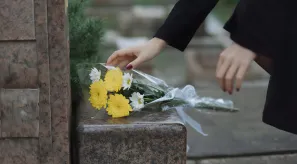Cremation is becoming an increasingly common option following the passing of a loved one, yet not all families know exactly how this process works or what the requirements for cremation are. At Stelae, we help you understand it clearly with this straightforward guide.
What are the requirements for cremation?
When choosing cremation, families need to complete certain steps beforehand to proceed with the process.
Firstly, it's essential to gather specific documentation to verify the details of the deceased loved one. Additionally, selecting a suitable funeral service provider and authorising the cremation are necessary steps that involve fulfilling specific requirements.
Which documents are needed for cremation?
One of the key requirements for cremation is obtaining certain documents that are essential to ensure the procedure is carried out legally and smoothly.
Death certificate: why is it essential?
Obtaining the death certificate is essential as it officially confirms the death, as well as the identity and other details of the deceased, such as date and cause of death.
This document, issued by the Civil Registry, is required for various funeral arrangements following the passing of a loved one. Among these, it is necessary to obtain the cremation permit issued by health authorities to proceed further.
Family authorisation: who can request it?
A direct family member must handle the family authorisation, providing their own personal details and serving as the recipient of the loved one’s ashes once the cremation process is completed.
Authorisation responsibility lies with the closest relatives of the deceased, following the hierarchical order established by law.
Legal requirements according to local regulations
Cremation requirements in Spain can vary between autonomous communities, so it's essential to verify the specific local regulations to complete the required procedures accurately.
Generally, the relevant health authority must authorise cremation. However, each autonomous community has specific regulations detailing the required procedure and documentation.
Step-by-step process to fulfil cremation requirements
How is cremation performed? The deceased’s body must be prepared, transported to the crematorium, cremated in an authorised cremation furnace, and the ashes must be collected and returned to the family, in compliance with current regulations. For this, contacting an authorised funeral service is essential.
Contact Stelae Services
The first step to fulfilling all cremation requirements is contacting a high-quality funeral company such as Stelae. We handle the entire process, easing the family’s burden during the difficult time following the passing of a loved one.
How to ensure compliance with current regulations
At Stelae, we include legal formalities and licence acquisition within the cremation service cost for all our offerings, ensuring compliance with current regulations.
Additionally, we manage the collection and transportation of the deceased, pacemaker removal if necessary, cremation, and subsequent ash custody and delivery services. We also provide telephone psychological support for families who require it.
Differences between cremation and burial regarding requirements
The main difference in requirements between cremation and burial is that cremation requires specific authorisation to proceed. In contrast, burial involves obtaining municipal permission for cemetery usage. This requirement also applies if ashes are to be placed in a cemetery.
Other requirements, such as obtaining a death certificate or using a coffin (mandatory during cremation), apply to both procedures. However, direct cremation can avoid some additional funeral services and associated expenses compared to traditional burials.
Benefits of fulfilling cremation requirements with Stelae
Stelae’s direct cremation service provides several advantages when fulfilling cremation requirements.
Quick and hassle-free processing
Direct cremation is a straightforward process, allowing families to avoid extra services and costs such as viewings, ceremonies, or additional funeral expenses.
Personalised attention in difficult times
At Stelae, we provide personalised support to families, managing all necessary arrangements to ease their emotional and practical burdens during difficult times.
Tailored solutions to suit your needs
We offer various direct cremation options tailored specifically to each family's individual requirements, preferences, and budget.
Frequently asked questions about cremation requirements
Is judge authorisation required for cremation?
No, judge authorisation is generally not required, except in exceptional circumstances such as violent or suspicious deaths or judicially contested family disputes. Usually, family authorisation and the licence issued by health authorities are sufficient.
Can cremation be performed without a ceremony?
Yes, direct cremation without a ceremony is increasingly common, either to reduce costs or to honour the deceased’s or the family’s wishes.
What to do if necessary documents are missing?
To ensure all necessary documentation is obtained and cremation requirements are fulfilled, the best option is to choose a qualified and experienced funeral company like Stelae, which will handle all the required procedures efficiently and in compliance with the law and established deadlines.



